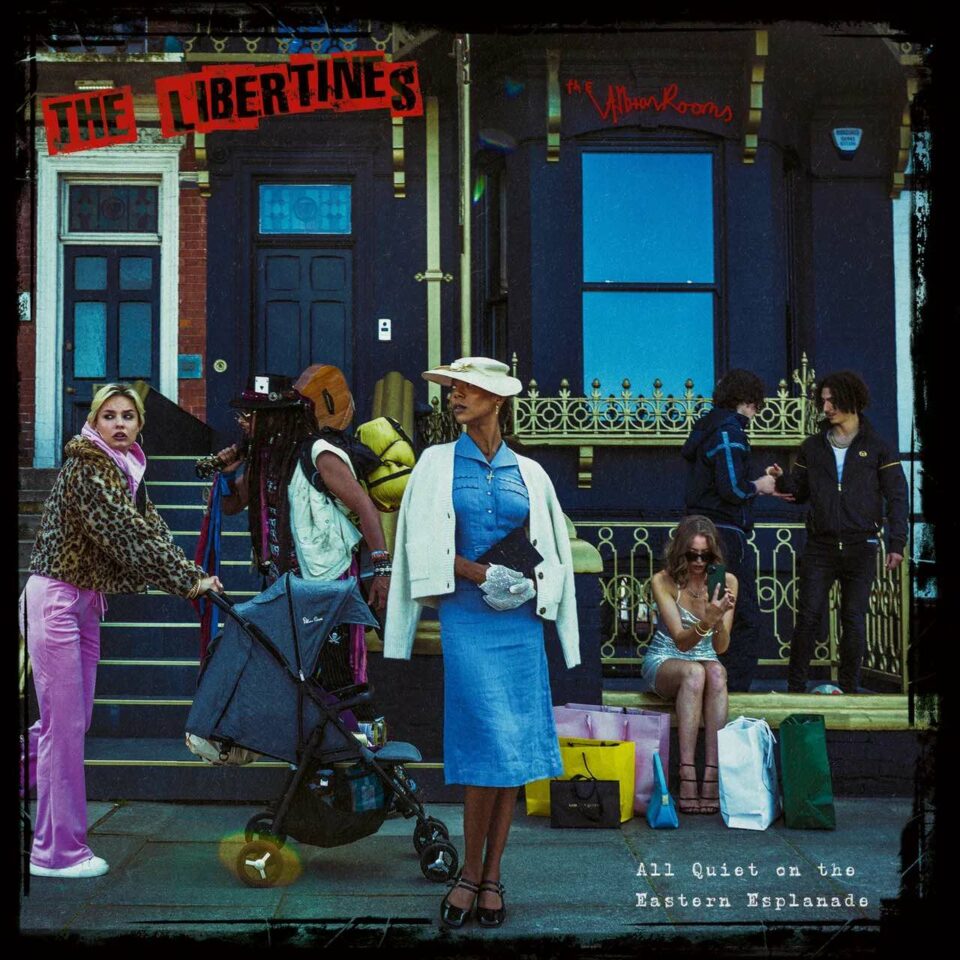During our phone chat on a warmer-than-usual February day in Toronto, Meg Remy considers the looseness of two words’ definitions: “apocalyptic” and “political.” Her consideration of the former is a quick aside as we discuss how the day’s unexpected warmth demonstrates that, yes, the climate is, indeed, changing. Her contemplation of the latter could entirely summarize Heavy Light, the new album from her project U.S. Girls.
“Politics is made up of so many things,” Remy says. “It’s a mask that all these things hide behind, like white supremacy, patriarchy, and capitalism.” As the brains behind a band titled “U.S. Girls”—calling to mind a demographic that couldn’t so much as vote for over a century—she might be expected to write music that weighs in on these political topics, and she often has: On 2015’s Half Free, her characters were women constrained by patriarchal oppression, and 2018’s breakthrough In a Poem Unlimited placed U.S. Girls in the pantheon of music’s most outspoken leftists. Heavy Light, then, might at first come as a surprise.
“With Half Free, I thought I could speak for all women, and I was wrong,” Remy says. “With Poem, I was trying to shock people and force them into thinking, and that didn’t work either.” So for Heavy Light, she looked inward and gathered her cavalcade of collaborators to conjure a collection of songs about hindsight and empathy. These topics might initially seem like roughly the opposite of political, and the album’s tender, often soulful ballads comprised of classical pianos, percussion, and vocal harmonies might also seem like a 180 from U.S. Girls’ longtime sneering riots. But take a second more to think about it, and Heavy Light couldn’t be a more logical next step.
On new songs such as the piano ballads “Woodstock ’99” and “IOU” Remy looks back on her life and empathizes with other people, and her attempts to forge these connections touch upon the class disparities and general chaos that define capitalism. On “IOU,” Remy responds to her vocal harmonists’ call of “You didn’t choose to be born” with a gentle response: “I never heard of anyone who has / I’ve never known no baby with a plan / For how to survive,” she sings, reminding listeners that we’re all wading through the muck and figuring out how to stay alive in this cruel, cold, profit-driven world.
Remy says she wrote “Woodstock ’99,” which compares and contrasts the distinct ways in which she and a friend watched the titular event, so the two could understand each other’s “quirks, the way we do things, and the way our lives have led to this point.” “What does it say about us, our mothers, their TVs, our looks?” Remy sings, asking a question that vaguely references class boundaries. She says the song achieved the desired effect with her friend, though she’s aware that some listeners might doubt that comparing two perspectives on the same personal experience could offer them the same insights (regardless, the song’s campy interlude about a rain-spoiled cake is certainly a prime example of the humor that has long defined U.S. Girls).
If it seems like a stretch to call a Woodstock ’99 compare-contrast retrospective and a song about survival “political,” then just look at Heavy Light’s re-recordings of older U.S. Girls songs (a tradition that began when Remy revamped her song “Don’t Understand that Man,” from her debut album Introducing…, for her fourth album, 2012’s GEM). Additionally, tracks “Advice to Teenage Self,” “The Most Hurtful Thing,” and “The Color of Your Childhood Bedroom” serve as audio collages in which Remy asks her numerous collaborators to answer prompts common in creative writing and theater classes. The results touch on topics including organized religion, the body acceptance movement, and stigma surrounding mental illness. Remy says that the collages demonstrate not just “that we’re all connected and our stories are all mingled,” but that “we’re all responsible for each other.”
“I can’t speak to others’ lives. I can just let people know what I’ve experienced, what I’ve learned, and maybe it’s helpful, maybe it’s not.”
If the collages take stances via empathy, then the re-recorded old songs find poignance in hindsight. Remy says she and her band chose to re-record Free Advice Column’s “Overtime,” U.S. Girls on KRAAK’s “State House (It’s a Man’s World),” and Go Grey’s “Red Ford Radio” because they’re “songs of people looking back with a lens that either goes in really far or zooms out really wide.” These old songs—rendered on Heavy Light as, respectively, a stormy freakout about hidden addiction, a bare-bones spiritual about powerless women, and a liberation-focused barrage of terrifying gong hits—are as steeped in Heavy Light’s hindsight as in U.S. Girls’ formerly overt rhetoric (which only one Heavy Light song, the funky, tongue-in-cheek opener “4 American Dollars,” recalls).
Even if Heavy Light earns a reputation as the least political U.S. Girls work to date, there’s one way in which Remy explicitly uses the album as a statement piece. When In a Poem Unlimited propelled U.S. Girls to the forefront of whatever “indie rock” means in the modern era, critics often noted how tight and visceral Remy’s huge live band sounded. To that end, she’s taken active measures to de-center herself from the U.S. Girls project and focus on her collaborators. “Capitalism really wants it to be that we’re all a bunch of individuals,” she says. “I try to force that tension to be visual by showing everybody.” She means that literally: In the press photo that circulated when U.S. Girls announced Heavy Light, she’s barely present. She’s lying on the floor, almost out of frame, with fourteen of her collaborators situated behind her working on music and having a blast.
Those collaborators include, among others: vibraphonist Dan Morphy; vocalist James Baley; current E Street Band saxophonist Jake Clemons; songwriters Jimmy Webb, Rich Morel, Louis Percival, Kassie Richardson, Twig Turnbull (Remy’s husband), and Basia Bulat (whom Remy describes as her “sister”); and vocal arrangers Dorothea Pass and Kritty Uranowski. Remy ascribes extra significance to Uranowski, whom she credits with teaching her the measured, technically astounding vocal style she debuts on Heavy Light.
“I wish other people were being interviewed about this record that were part of making it. The system only wants to focus on one person,” Remy says, and her spotlighting her musical cohorts is as explicitly anti-capitalist as Poem-era U.S. Girls. With Heavy Light, though, she teaches lessons without preaching.
“I’ve had some really kind people say to me, ‘Hey, you can’t speak for all women,’” Remy says of why she looks inward on Heavy Light instead of proselytizing. “I’m really lucky I had people in my life that could say, ‘You may be well-intentioned, but you should rethink this.’” Now, she realizes, “I can’t speak to others’ lives. I can just let people know what I’ve experienced, what I’ve learned, and maybe it’s helpful, maybe it’s not.”
Thanks to Heavy Light’s beloved hindsight, Remy has achieved a deft balance of introspecting and making sharp points. “My three [most recent] albums, it’s the porridge thing,” she says. She now thinks Half Free and In a Poem Unlimited were too hot and too cold, but Heavy Light? “This one,” she says, “is maybe, a little bit, just right.” FL









